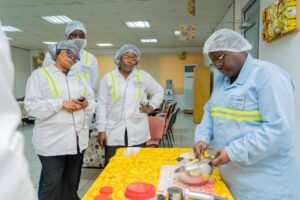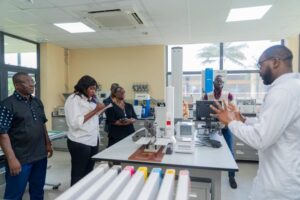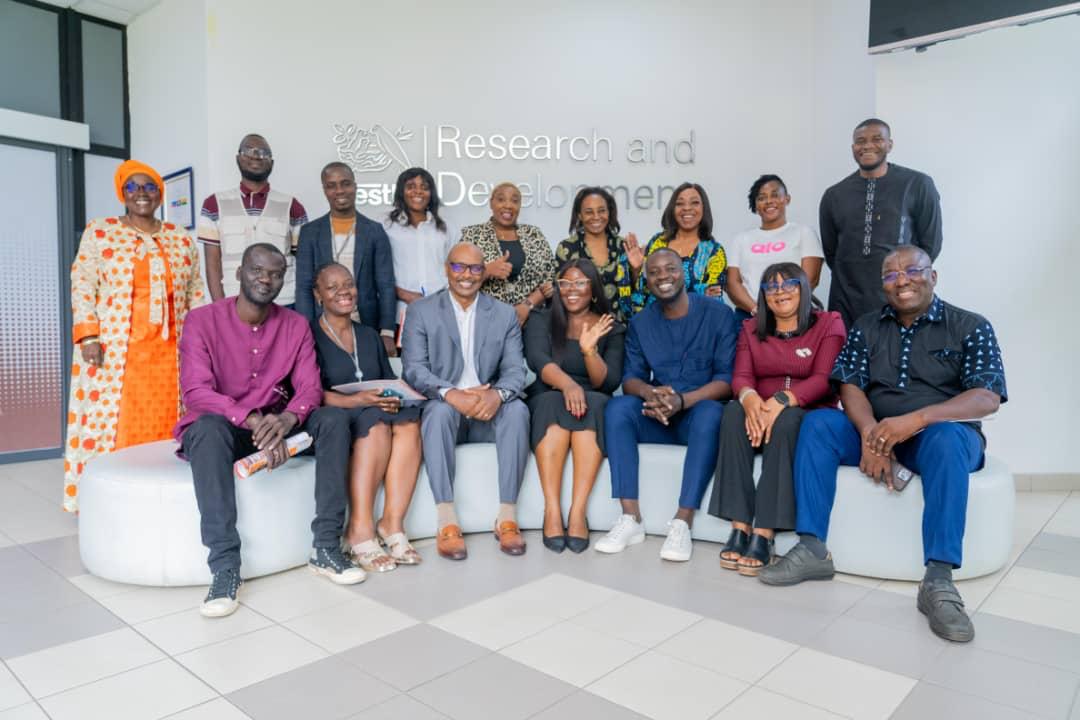By Andrew Nsoseka
Nestlé’s Research and Development Centre in Abidjan, Côte d’Ivoire recently opened its doors to journalists from across West and Central Africa. The event revealed to journalists how the facility serves as the scientific backbone for the company’s nutrition portfolio in the region, creating win-win partnerships with local farming communities. This approach allows the world leader in food and beverages to produce foods to a global standard, with tastes and flavours recognised and loved by local consumers.
The immersion event on 11 September offered unprecedented access to the cutting-edge laboratories and experts behind some of Africa’s most popular food products. Specialists presented their work and answered questions from journalists drawn from across the region.
Media representatives witnessed first-hand how Nestlé combines scientific innovation with local sourcing to address nutritional challenges while empowering agricultural communities. The Abidjan R&D Centre, the only facility of its kind in sub-Saharan Africa, is a crucial hub for developing affordable, nutritious products tailored to African tastes and needs.
Inside Nestlé’s African Innovation Hub
The Abidjan R&D Centre, part of Nestlé’s global network of over 20 research locations, employs a multitude of food technologists, scientists, and engineers who specialise in innovating cereal, dairy, snack, and beverage solutions for African consumers.
During the facility tour, journalists observed advanced food laboratories where researchers develop products using locally sourced ingredients. These are adapted to meet nutritional requirements, regional taste preferences, local laws, and the company’s global standards.
Speaking to reporters, Tesfalidet Haile, Head of Nestlé’s R&D Centre in Abidjan, said that as the company strives to develop more affordable, nutritious products for consumers in emerging countries, the Abidjan centre plays a crucial role in understanding local nutritional gaps and preferences. He emphasised that the centre’s work directly supports lower-income families who often lack essential nutrients in their daily diets due to limited resources.

Journalists at the Nestle factory observing the production process of Maggi
Local Sourcing as a Priority
A central focus of the event was showcasing how Nestlé incorporates locally sourced ingredients and raw materials into its products while supporting agricultural communities. Company representatives detailed how they have increased the sourcing of local raw materials from African countries to reduce reliance on external suppliers. This, in turn, invests in the local economy and makes communities more economically viable.
In this light, Tesfalidet Haile explained that they have researched and improved local products and empowered communities to produce them in both good quality and quantity so that the company can purchase them for use in its factories. He noted that locals are not compelled to sell to Nestlé, but because of the special bond forged through a win-win partnership, communities consistently choose to supply them.
It was revealed that in Nigeria, for instance, Nestlé has transitioned from imported corn starch to cassava starch in its Maggi products. This supports approximately 4,000 local farmers across 65 villages while reducing supply chain vulnerabilities. Similar initiatives are underway in several countries across the region.
Nutrition Innovation for African Needs
The journalists learned how Nestlé’s product development directly addresses widespread nutritional challenges across the continent. The company stated that, due to increasing needs, it has fortified most of its products to boost micronutrient content.
It was revealed that in Côte d’Ivoire, for example, Maggi Light has been introduced. However, many mistakenly believe it is for diabetic patients or the sick, when in effect, it is simply Maggi with less salt.
Empowering Farming Communities for Win-Win Partnerships
Beyond product development, journalists gained insights into how Nestlé’s agricultural programmes create sustainable livelihoods for thousands of farmers across the region. The company provides technical expertise, financial support through advance payments, and assistance with capacity building to help local suppliers meet quality standards.
In Côte d’Ivoire, Nestlé sources cassava from approximately 4,000 local farmers based in 65 villages, most of whom are women. This initiative not only ensures a steady supply of raw materials but also creates economic opportunities for rural communities. Similar programmes support cocoa farmers through the Nestlé Cocoa Plan and its Income Accelerator Programme, which aims to improve agricultural practices while supporting community development.
Journalists Gain Access to Production Units
During the visit, journalists were also taken to a Nestlé production plant to see first-hand how products are manufactured. They received demonstrations on how Maggi is produced, starting with a hands-on session followed by excursions to the full-scale production and packaging lines.
Asked how Nestlé keeps its sourcing authentic amid the growing use of genetically modified (GM) foods, which are not widely favoured, Tesfalidet Haile told The Post that local laws in Africa do not allow for the use of GMOs, which is why they are not used in their production in the continent. He said that in regions like the USA where it is permitted, the company clearly labels all packaging so consumers are aware.

Journalists at one of Nestlé’s lab at the Research and Development Centre in Abidjan
Environmental Protection at the Core of Operations
Nestlé officials reaffirmed their commitment to environmental preservation through continued investment in research, environmental protection programmes, sustainable packaging, and sustainable practices. The team stated that they will not pursue any operations deemed harmful to the environment.
Nestlé’s Commitment to Being Close to Its Consumers
The team at the R&D centre in Abidjan stated that local sourcing and community empowerment are core to their operations in Africa. Patricia Ekaba, Head of Corporate Communication and Public Affairs for Nestlé’s Central and West Africa Region, said their presence in Africa ensures the company is close to consumers and communities. This proximity allows them to understand nutritional gaps and preferences and innovate solutions that address those needs.
The company plans to expand its localisation efforts across the region, building on successful initiatives that have been tested and proven. This expansion will likely create more opportunities for local farmers while developing products better tailored to regional nutritional needs and taste preferences.
The company says poverty impacts food security, and many people tend to prioritise feeling full, even when their diet lacks essential nourishment. As such, fortification is presented as essential.
Nestlé says its years of experience in the field—registering 400-500 patents a year—enables them to provide accessible and affordable nutrition to their customer base. Concerning infant nutrition, the company stated that they adhere to WHO guidelines.
The tour ended with a visit to a UNESCO centre in Abidjan, where Nestlé works in collaboration with UNESCO to build the capacities of young people and women. The highlight was the presentation of a functional literacy programme. Through this initiative, women who had no opportunity to attend school have been trained to read, write, and carry out economically beneficial projects, including modern farming techniques that have improved their living standards and economic viability.

